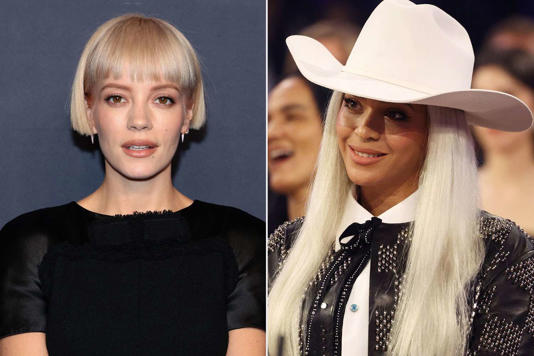The realm of music is often characterized by diverse interpretations, artistic expressions, and genre adaptations. Recently, singer Lily Allen shared her perspective on Beyoncé’s rendition of Dolly Parton’s classic song “Jolene” on the Miss Me? podcast. Allen’s critique sparked a conversation about the complexities of covering iconic songs, artistic freedom, and the evolution of musical genres. This article aims to delve into Allen’s comments, analyze the dynamics of Beyoncé’s cover, and explore the broader implications for music and creativity.
Understanding Allen’s Critique: Lily Allen, along with her co-host Miquita Oliver, expressed their thoughts on Beyoncé’s cover of “Jolene,” questioning the choice to tackle such a well-known song within the country genre. Allen described the cover as having a standard hip-hop beat and suggested that Beyoncé could have explored more creative avenues in interpreting the song. Her comments reflect a critical assessment of Beyoncé’s approach to the cover and raise questions about artistic integrity and innovation.
Exploring Beyoncé’s Interpretation: Beyoncé’s rendition of “Jolene” forms part of her Cowboy Carter album, showcasing her exploration of country and western themes. While the cover diverges from the traditional country sound, Beyoncé infuses the song with her unique style and vocal prowess. The incorporation of hip-hop elements and contemporary production techniques adds a modern twist to the classic track. Beyoncé’s interpretation offers a fresh perspective on “Jolene,” highlighting the versatility of the original composition and the artist’s ability to transcend genre boundaries.
Analyzing Artistic Freedom and Genre Adaptation: The discussion surrounding Beyoncé’s cover raises broader questions about artistic freedom and the evolution of musical genres. Artists often face scrutiny when interpreting iconic songs, as audiences may have preconceived notions about how the music should sound. However, creative reinterpretation is essential for pushing artistic boundaries and breathing new life into familiar compositions. Beyoncé’s willingness to experiment with different genres exemplifies her commitment to artistic innovation and exploration.
Navigating the Intersection of Culture and Identity: The conversation initiated by Allen’s critique also touches upon themes of cultural representation and identity in music. As a Black female artist, Beyoncé’s foray into country music challenges traditional notions of genre ownership and authenticity. Her success on the Hot Country Songs chart with “Texas Hold ‘Em” underscores the diversity of musical influences and the importance of embracing cultural heritage in creative expression. Beyoncé’s achievements in country music pave the way for greater inclusivity and representation within the genre.
The discourse surrounding Beyoncé’s cover of “Jolene” serves as a testament to the multifaceted nature of music and the complexities of artistic interpretation. While Lily Allen’s critique offers valuable insights into the nuances of genre adaptation, Beyoncé’s rendition exemplifies the power of creative expression and musical evolution. Ultimately, the diversity of perspectives within the music industry enriches the cultural landscape and fosters innovation. As artists continue to explore new horizons and challenge artistic conventions, the conversation surrounding music and creativity remains vibrant and dynamic.
